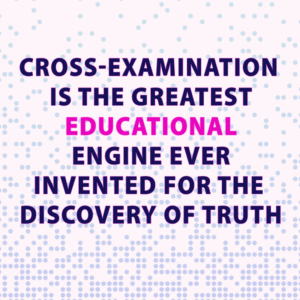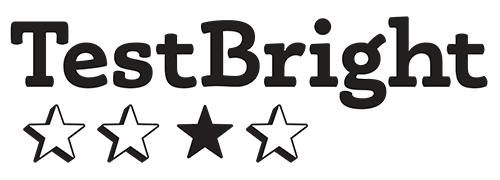 [MB: King of Kahoots Rob Pollak previously shared key insights into asking the right questions during instruction. This follow-up explains applications for direct and cross examination]
[MB: King of Kahoots Rob Pollak previously shared key insights into asking the right questions during instruction. This follow-up explains applications for direct and cross examination]
I’m not a real lawyer anymore, and I don’t play one on TV. But my time in law school and practicing law strongly informs how, when, and why I ask questions to students. There are times when open-ended questions are essential to give your students a chance to explain their understanding of topics and provide you with valuable feedback. There are other times, however, when your job is no longer to get at big topics, but to dive down into the nitty gritty details and hone in on the exact spot of vulnerability in the student’s understanding of a topic.
In litigation, this is the primary difference between how an attorney will question a witness in direct examination and how to question a witness on cross examination. So when should you use these different approaches?
Direct examination – Open ended questions:
In the first session with a new student, you should absolutely be in direct examination mode. Before you start teaching, you must have an understanding of the person sitting across from you and what they’re hoping to accomplish. Here’s how I start every first session:
Hi student, it’s nice to meet you. Your mom/dad told me a lot about you and where you’re at in the process. However, I find moms/dads to be quite unreliable… Can you tell me a little bit about yourself and what you’re hoping to get out of this process?
Then I shut up and listen. The student now trusts you a little bit because you’re showing you care about their opinion and view of themselves. You also get a lot of insight into what is important for this student. After their summary, I ask some follow up questions and then to describe what their schedule is like in school, how they feel about math vs. English, and if there are any things I should be sure to cover. I’ll also do something similar at the beginning of our subsequent sessions. How was this week for you? What did you find challenging on the homework? etc. The more you get the student talking, the easier your job will be.
Cross Examination – Closed-ended questions:
There are other times, when you want to be very direct in your questioning. One of those times is when you’re reviewing specific mistakes a student made. Start with the broader questions and then dig down into the specifics with yes or no questions:
FIRST Q: Why didn’t you answer this question?
A: I didn’t know how to do it.
Q: What do you think you could have done to get started?
A: I don’t know.
Q: Could you translate the words into a math sentence?
A: Yes.
Q: Could you draw a picture?
A: Yeah.
Q: Did you?
A: No.
Q: Wouldn’t that have helped?
A: Probably.
FIRST Q: Why do you think you got this one wrong?
A: It was a stupid mistake.
Q: What do you mean? How was it ‘stupid?’
A: I added 2 instead of subtracting.
Q: Is there anything you could have done to prevent that?
A: I’m not sure.
Q: Is there anything written on your paper?
A: No.
Q: Could you write out your work?
A: Yes.
Q: All of the steps?
A: Yes.
Q: Do you think you’d make the same mistake if you wrote out all those steps?
A: Maybe. I’m not sure.
Q: Have you ever tried to do a full math section where you write out all steps?
A: No.
Q: Do you think it might be worth a shot to try?
A: Yes.
Even here, it’s best to start with the broadest questions and try to get the student talking. If that’s not working, then you’ll have to do more of the work to elicit the information you want. Keep in mind that the clearer vision you have of where you want to go with your questioning, the easier time you’ll have guiding students down the path that leads them to come up with their own solutions.
Tutor Tips, Tools, and Thoughts
What does the research say about standards-based grading?
Grades should have meaning.
How long should GRE (or any other test) prep last?
See if you agree with me and Tyler York on the ideal duration of prep.
What happens when teachers run the school
Those of us in the private sector won’t be surprised that teachers can make great leaders.
21 Life-Changing Takeaways from Atomic Habits (+ Free PDF)
You’ve heard how amazing James Clear’s book is. Skim the cream in 20 minutes.
It’s the End of Retirement as We Know It
Our modern concept of retirement is a 20th-century construction that’s already unraveling.
Did you enjoy this issue of Tutor: The Newsletter? Get the next issue right in your inbox by subscribing below–only subscribers get the Tutor Classifieds:
